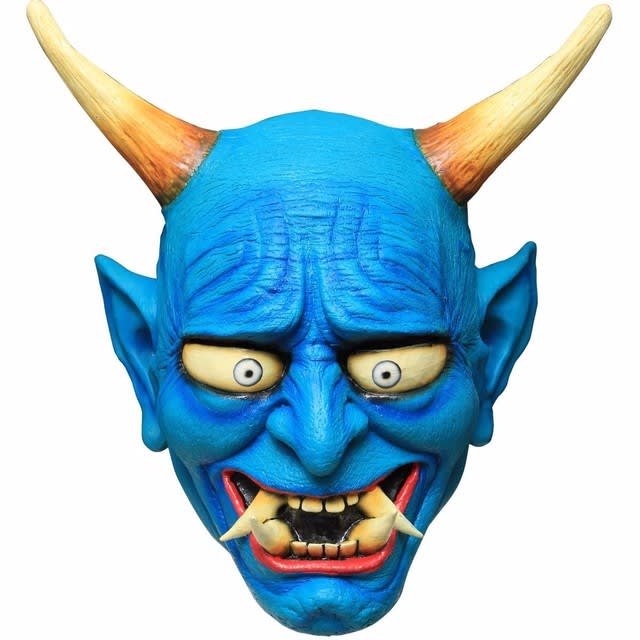
私は鬼であった
I was a phantom
鬼でないと人間界で生きることはできなかった
If not a phantom, I could not live in human world
私の鬼は
The phantom of me
怒りで燃える炎であって
It was a flame that ignites with anger
哀しみを切り倒す剣を持っていた
It had a blade to chop down sorrow
その剣で
With that blade
無感覚をえぐり抜き出し
Hollowed out a numbness
心の鎧を切り倒し
Chopped out mental armor
目にへばりついていた重い瞼を切り離した
It detached heavy eyelids that had been stacked on my eyes
怒りの炎は
The anger flame was
恨みを燃やし
Ignited pique
憎しみを燃やし
Ignited hated
無関係も燃やした
It also ignited irrelevant
孤独な独りよがりも燃やした
It also ignited solitude that solo satisfied
私が鬼でいられたのは
I could have been as a phantom because
私の鬼が
人間を殺さないように
守ってくれたエンマ大王がいたからだ
The phantom of me was protected by Raja the great
And he taught the phantom not to kill human beings
そのエンマ大王は
私の鬼を救い
人間被りの鬼も救った
Raja the great saved my phantom
Also, he saved other masqueraded phantoms
その縁魔界での戦いは終わった
The conflict in a raja deity was over
その縁魔が人間界にいられる期限が切れてきたからだ
Because Raja the Great staying in human world is getting to expired
そのエンマ大王が縁魔界に行ってしまったら
If Raja the great would gone to his kingdom
私の鬼もエンマ大王魔につられて
縁魔界に消えて行ってほしい
I wish he takes my phantom to his kingdom
So, my phantom could be gone with him
私の鬼を見送ることができたら
If I could see off my phantom
人間として生き
I could live as a human
人間の期限が切れたら
When my staying expired as a human
エンマ大王が戻った縁魔界に戻り
Returning to his kingdom where he would be there
そのエンマ大王にまた会いたい…
I want to see him again…





























真相が明るみに出てKの無実が明白となった。
法律では裁けない罪や悪がある事を知った。
裁きはエンマ大王に託して
二度と心を煩わされないぞと最終結を図る。
・・・トラウマの脱却、・・・戦いの終り
Keiren: I wrote a paper in college about demons for a literature class. It is the one paper from college I saved. I will try to find it while cleaning basement. I think it will be interesting to read and discuss when you return home.
The morning is late so off to work I go.
『エンマ大王が審判者になった餓鬼、地獄界のこと』です。
いずれ、何の比喩だったのかを直接説明できると思います。
今は説明する気力が無いので、了解ください。
『君よ憤怒の河を渡れ』
真相が明るみに出てKの無実が明白となった。
法律では裁けない罪や悪がある事を知った。
裁きはエンマ大王に託して
二度と心を煩わされないぞと最終結を図る。
・・・トラウマの脱却
・・・戦いの終り
私の欠片が書いたようです。
そっくり一致するので
そのまま、貼り付けておきます。
I hope the paper is not a long one...hihihi
人のB麺は阿修羅の面影をしており、マスカレード(仮面舞踏会)して平べったい人の顔で表面をつくろう。
正義感に駆られたKさんとしては憤怒のエネルギーで、その「被り面」を叩き割ってしまいたい。
闇を作り出すトンネルを山ごと吹き飛ばして
光の当たる平地にしたい。
mmm、確かに「スカッとさわやかコカ・コーラ」するようだ。
しかしTはその様な意気を持ち合わせない。
恰も「炭酸の抜けたコカ・コーラ」の如くで・・・
闇のトンネルを仮面を被ったまま通りすごして、
その闇を一人で墓場まで持っていくのだ(すんまへん!!)。
(注;尤もTの墓場は深い海の底のツモリだが・・・)
(仏教系用語と思ったが…実は)キリスト教系用語で、【七つの大罪】と言うのが在った。
憤怒は七つの大罪の一つだそうだ。Kさんの滞在中、解毒剤が施されそうだ。
千代亀(ちよき)の小舟に同乗し
五次元世界の河に漕ぎ出でて
放電現象の雷神エネルギーで走り抜け
オーソレミヨ山で、・・・亡霊群と・・・・
「最終決」着に漕ぎつける。
これで憤怒が消えてなくなる。
七つの大罪;
憤怒、傲慢,暴食、色欲、強欲、怠惰,嫉妬
七つの大罪の対立語;
慈悲、謙虚、節制、純血,救恤(きゅうじゅつ)、勤勉、忍耐
ケッペキ(潔癖)人が好きそうな言葉だ。
ケッペン(欠片)…正常な状態のものから何かの破片が欠けてしまった物体の事だ素~だ…面白い!!
欠片+破片=遺跡の復元、自分探し完成品
本当の自分とは何か??
(蝶々じゃなくて雉なのよ篇)
『つまり一度、或る価値観に取り憑かれてしまうと、
今度はそれが導いて行く先が、
必ずしも自分の生活に取って、
或いは人生に取って、
負担になったとしても、
もう捨てられないですね。
一度、例えば自分が信じてしまった価値観念
という事を、そう簡単には捨てられない
・・・なぜなら信じたい自分が愛(いと)おしいからです(続)
Indeed, T is absolutely correct that Anger is listed as one of these 7 Deadly sins identified in Christianity.
I am not a Christian. Actually I am not religious, but cultural bloodline is primarily Jewish. Anyway, this "Anger" sin accurately identified by T is often, in my opinion, misunderstood by Christians.
If we look at a list of these 7 deadly sins it will usually replace "Anger" with the term "Wrath".
As such, the sin may not be well understood. "Wrath" suggests taking action against an enemy, etc.
But T more correctly identifies the sin. Probe what they meant by "Wrath" when the list of sins was developed, and we find that "Wrath" in fact does mean "anger or rage", etc. and does NOT require overt action.
Of course, in the modern world, perhaps even devout Christians would NOT want to consider Anger itself a sin.
Although the organized religion might want to keep it, if only to dissuade people from getting mad at the Church.
That's a joke by me...I think...
There are stark differences between Judaism and Christianity with respect to Sin. Jews to some extent puts less emphasis on sin. It is an older religion, and the Jewish God tends to be a bit Wrathful itself.
Example: The story of Job (pronounced Jobe) who committed no sin but still had to bear the wrath of God. Christianity is a newer religion, so its God seems to be more forgiving, or at least less arbitrary.
But, in many ways, the older a religion is, the more modern it remains....perhaps because they are less influenced by the so called Dark Ages in Europe.
Judiaism has three classes of sins, the last of which is quite interesting:
Sins against God
Sins against other people
Sins against against oneself.
Anyway, the Jewish story of Job is fascinating...Job is subjected to all sorts of pain and injury and poverty, loss of his family and dignity...and all of this misery is caused by a casual bet, a mere wager, between God and a Demon.
It is taught that the story means mortals have no right to expect fairness from Gods, and no right to get pissed off either. But I always thought it meant a Deity could behave badly too....Sometimes refreshing to a young mind to bring God and Demons down a peg or two.
It's been 5000 years and people still debate about why on earth the Story of Job is in the Bible at all. My opinion....Whether its healthy or not, he has every right to be angry at both God and the Demon!!!!
My apologies for any religious readers, nothing here is meant to belittle your Faith. It is not my intention to offend. I simply enjoyed reading T's comment and it got me thinking....